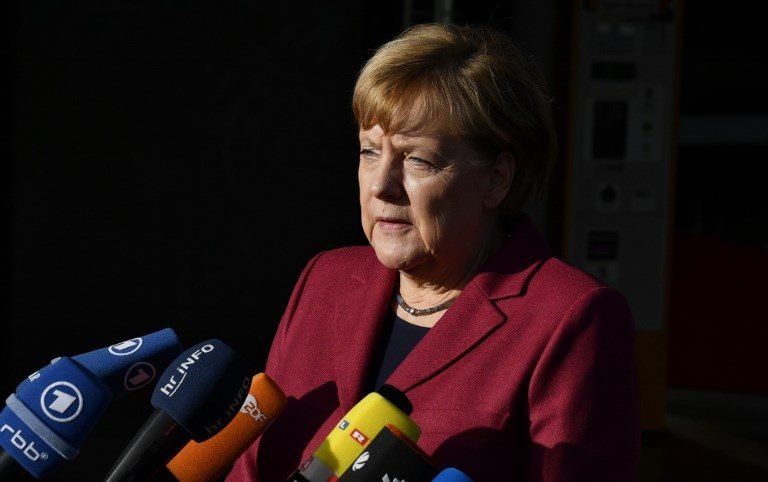SUMMARY
This is AI generated summarization, which may have errors. For context, always refer to the full article.

BERLIN, Germany – Chancellor Angela Merkel said Germany’s top parties still had “big obstacles” to surmount before reaching a new coalition deal, as a last-ditch round of negotiations went down to the wire.
After more than 15 hours of talks and still no agreement in sight between Merkel’s conservatives and the center-left Social Democrats, German media reported that the meetings could drag past the Thursday, January 11 deadline into Friday, January 12.
Issues surrounding finance were emerging as key sticking points even as Germany posted sterling growth for 2017 and a record surplus.
Merkel, who is battling to form a new government to salvage her political future, had warned that it would be a “tough day” of talks.
She said her conservative Christian Democrats would “work constructively to find the necessary compromises but we are also aware that we need to execute the right policies for our country”.
September’s inconclusive elections left Merkel without a majority and struggling to find partners to govern Europe’s biggest economy.
After her earlier attempt at forging a coalition with two smaller parties collapsed, she is now pinning her hopes on renewing an alliance with the Social Democrats (SPD).
SPD leader Martin Schulz also spoke of “big obstacles” on the last day of preliminary talks in which the parties were sounding each other out over whether to move on to formal coalition negotiations.
He said his party wanted to ensure that the new government was committed “above all to working toward renewal of the European Union”.
President Frank-Walter Steinmeier reminded all sides that they “have a responsibility towards Europe and for reliability, partnership and engagement in international politics”.
Merkel badly needs the talks to succeed, as do Schulz and the leader of her Bavarian allies, Horst Seehofer, said political analyst Karl-Rudolf Korte of Duisburg-Essen University.
“The negotiations are not just about a coalition, but also their careers. It would be the end for all 3 if this coalition does not come about,” he told public broadcaster ZDF.
Haggling over taxes
As Germany struggled to emerge from a 4th month of political paralysis, its economic health stood in stark contrast.
Yet ironically, it is issues surrounding the finances of Europe’s biggest economy’s that were holding up talks.
Seeking to push its social welfare agenda, the SPD is demanding greater relief for the lower and middle income brackets while seeking tax hikes for top earners.
But Merkel’s Bavarian allies, the CSU, would not accept raising taxes.
An agreement with the CDU would be “no problem, but the CSU is blocking everything,” complained an unnamed SPD negotiator quoted by Bild daily.
Beyond fiscal and spending issues, the parties are struggling to fend off the encroaching far right, which has seized on anger over the influx of refugees and netted a record showing at the polls in September.
To halt a hemorrhage to the far right, Merkel’s alliance wants a tougher stance on immigration, something that is hard to sell to the center-left SPD.
‘Skepticism justified’
Even if negotiators find a deal, it can still be torpedoed when SPD delegates and later rank-and-file members get to vote on whether the traditional labour party should once again govern in Merkel’s shadow.
The SPD’s youth wing chief Kevin Kuehnert told Zeit Online that he would embark on a national tour to press his case for opposing a new grand coalition before a September 21 party congress.
“The mood of the party rank and file with regards to a grand coalition is still grim. That’s why I think we have a good chance,” he said.
The SPD’s youth movement leader believes renewing an alliance with Merkel would deal a death blow to the Social Democrats, who suffered a historic low score in September’s elections.
A survey published by Focus magazine found that only 30% of Germans favor a return of the conservative-SPD alliance, while 34% prefer new elections.
Another poll, published by public broadcaster ARD, found that only 45% viewed a new GroKo positively, while 52% did not.
And a 3rd survey, for business paper Handelsblatt, showed that 56% believed Merkel would not see out her 4-year term. – Rappler.com
Add a comment
How does this make you feel?
There are no comments yet. Add your comment to start the conversation.